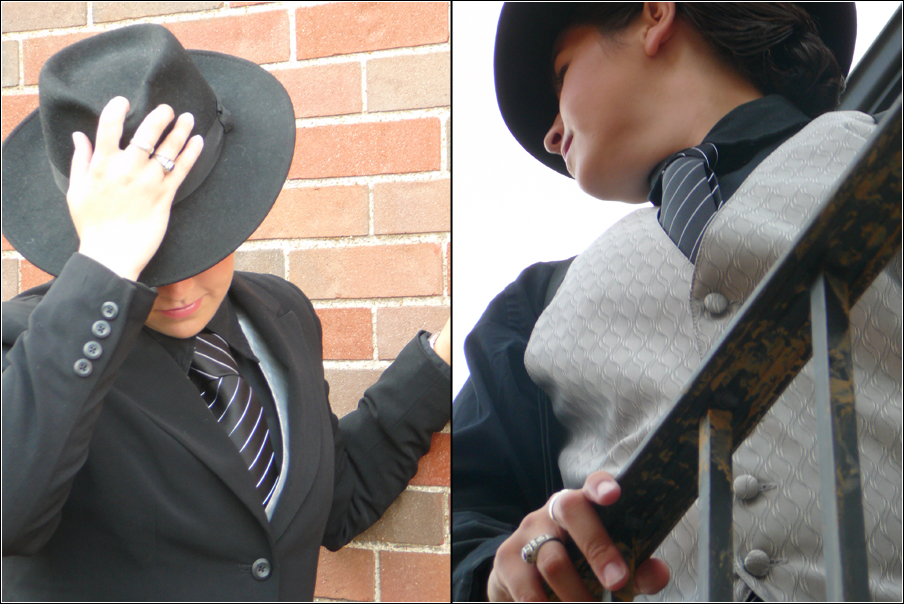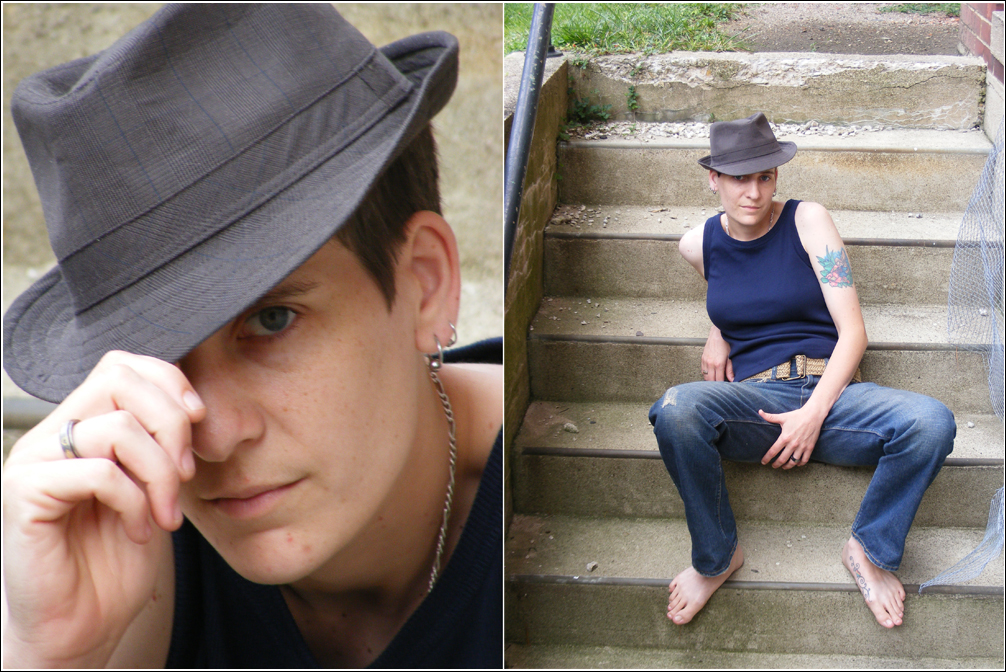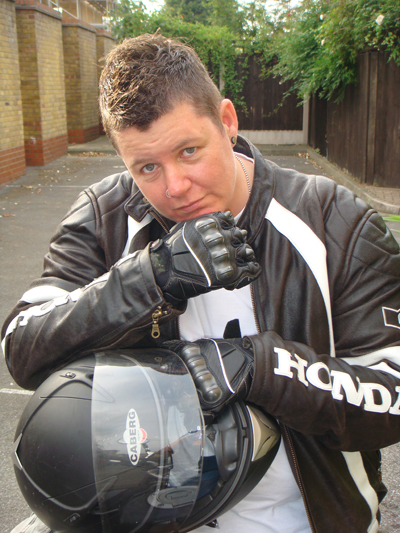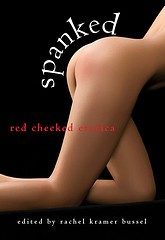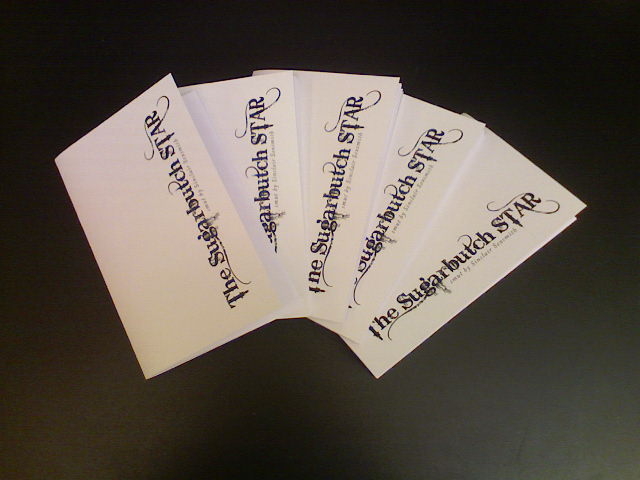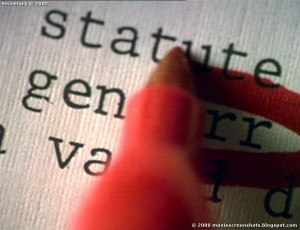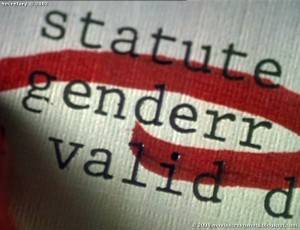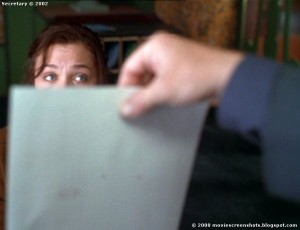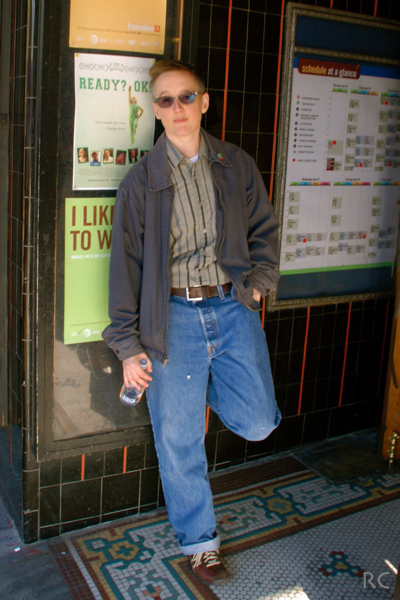This is the first Sugarbutch Star 2008 story, the submission is from Eileen at A Place to Draw Blood Laughing.
Her Best Line
I’ve heard the New York City subway referred to as a “hotbed of sin,” and it’s true, New York has the most attractive people with their most attractive fashion at any given moment.
Tonight, I’m on my way to meet the guys, play some pool, drink more whiskey, share weekend conquest stories. Jesse’s got the night off and will join us later.
She gets on at 9th Street, I notice her immediately. Petite, dark hair, gold glowing skin, big dark eyes, a thin swingy white wrap dress tied at her hip, simple white sandals with a small kitten heel and four straps over her ankles. She sits across from me and doesn’t notice me, she’s absorbed in Murakami’s Wind-up Bird Chronicles.
She’s gorgeous. She crosses and uncrosses her legs slowly, deliberately. She’s got this smoky eye makeup on that makes her dark brown eyes even bigger, liquid and pooling and I haven’t seen her lower her lids and look up under her lashes, but I’d like to.
I wonder if she’s queer. Then I wonder if that matters. Sure it does – it’s more fun to sleep with a girl who knows how to treat a butch in bed. We’re strange creatures, to some, after all. I think what I often think when I see a gorgeous leggy girl, reading some intellectual book, in barely enough clothing: if she’s queer, man, all is right with the world. I keep an eye on her, watching her movements, the way she brings a fingertip to her mouth and laughs to herself, the way her eyes dart, how her palm flips as she turns pages. She leaves her legs uncrossed once and turns her ankle in slightly, an unconscious but slightly submission that makes my hands ache.
I turn up my iPod, attempting to stop staring. She slips me a tiny bit of eye contact, just a sip, and a sideways smile that says she’s known I was there all along.
Damnit.
I shift unconsciously, take my leg down from the seat in front of me and cross my legs, sit up straight. My cock shifted wrong in that maneuver and now it is digging into my inner thigh, but I can’t adjust it – how tacky to go poking at my junk when she’s watching. I can’t shift my position again yet either or she’ll know I am adjusting myself for her gaze. I’m starting to wince from the way the cock is pressing into me, dull pain that may be making a bruise. That’ll be attractive.
I try to look casual and stare out the window as the subway takes the Manhattan bridge into the city. She turns pages, crosses her legs again. I reach into my pocket and finger one of my cards with only my name and cell number, black text on a simple white background. Classic. Minimal. I don’t need adornment. Except maybe her.
At Broadway/Lafayette I adjust my cock – finally, finally – as she shifts and other passengers block our view of each other, then I move to stand above her, holding onto the rail. She doesn’t look up. The train pulls into the station and I place my card in her book. She looks up, startled, and I get that amazing view of her eyes, the one I was waiting for, peering under her long dark lashes, open and big and I could get lost in the way they shimmer. She sees me and blinks.
“In case you want to call me,” I say, then step off the train.
I’ve stopped sweating by the time I get to the bar. My cell rings while I order my first Jameson rocks.
“Hello?”
“Well, if it isn’t Sinclair Sexsmith.”
No caller ID. Could it be her? I gulp. Does she know me? It must be her. So soon? “Yes, who’s this?”
“Jane,” she says. “On the D train. I thought I saw you notice me.”
“… You were impossible to miss.”
I can almost hear her blush. “Are you busy tonight?” she says.
“Out with friends at the moment, but I could be free later,” I say.
“Good. Come out to the bar at 24th and 10th. 10pm. Alright?”
“… Alright.” Why would I argue?
*
The bar is nearly empty, low lights and a few single patrons at the dark counter, quiet. Some low music is coming from somewhere, soft and subtle and electronic. The bartender is polishing pint glasses and laughing low with a woman in red, candles reflected in the glass as she polishes.
“Hey,” I say as I approach the bar, making eye contact with the bartender. “Can I get a Jameson rocks?”
She nods, but continues to wipe the glasses. I shoot her a puzzled look. She nods again – a gesture this time, I catch it, she’s directing me to look behind me.
I turn and she’s there. Jane. Same white wrap dress, same long legs and strappy sandals, same gorgeous dark eyes. She’s sipping a martini. A smile on her face like she’s amused. She has a second glass on her table: whiskey. On the rocks. Ready for me.
I take one, two, deliberate steps to her table. Place both my palms on it and lean over her, still standing, so she has to look up at me.
I tip my chin to the drink. “That for me?”
She swallows, holding back a smile like she’s the cat who got the canary, and nods. Almost nervous, but she’s covering it well. She’s so sexy with her tiny little movements, fingertips on the glass, looking at me shyly from the side. I don’t believe she’s queer. No, that’s not it – I don’t believe she’s the kind of femme who primarily sleeps with women. Yet. She picked me up, sure, but I’m beginning to fear I’m her experiment. Maybe she’s just a fan – but then again, so what? So maybe she knows what I like – am I being taken by the ways femme can undo me? Am I so preoccupied by her smooth legs (oh my hands on her ankles running up to her knees), her big eyes (looking up like she could swallow me), that I become willing? I’m a sucker sometimes. I’m skeptical. This girl clearly knows how to wield her power.
I keep eye contact for just a flicker, say “thank you,” sit down, and take a sip.
*
“I changed it,” she’s saying. “It’s my middle name, really. My grandmother’s. My mom is a second-waver, gave me one of those gender neutral names I always hated. But I never was a girly girl until I started dating butches.”
She leans in, as if telling me a secret. My second Jameson is melted ice and she’s halfway through her second martini. “I grew up a tomboy, I have three brothers. I mean, I was the bully on the playground! I begged my parents to let me play T-ball and little league like my brothers did. I was the only girl in the league, for a while. Others came after me. My first girlfriend in high school, we met on my softball team. I know, so gay.”
We laugh. I knock the ice around in my glass. High school girlfriend. Duly noted.
“I used to dress up for dances and stuff and get made fun of so much. ‘Hey, I thought you were gay!’ So I put my dresses away. Tried to fit into the lesbian uniform.” Jane shrugged, fingering the speared olives in her glass, leaned back again. “But, Sin, seriously – once I finally took my real gender out of the closet, it’s been adolescence all over again. New desires, new awakenings. I feel like a teenager.” The tip of her toes brush against my ankle.
“Is that so.” I lean in, catch her gaze; her eyes are alight.
“’Femme is knowing what you’re doing,’” she says, looking down into her drink, then giving me a penetrating stare. “Isn’t that how you say it?”
She’s quoting me. It’s hot. She gulps the martini, the liquid too much for her mouth, and chokes a little, sputters, then smiles and wipes her mouth with the back of her hand. My cock stirs.
“C’mon,” she says, and gets up.
*
Her place is nearby. It’s why she chose that bar – to interview me before taking me home. She planned the whole thing. Those were here best lines back there. She wants me, and she’s willing to work for it. I like that.
She locks the door behind us, positioning herself next to me, taking a few steps like it’s a dance and she’s leading so I follow, and then my back is against the door and she’s sighing and flipping her hair and waiting for me to kiss her.
So I do.
She tastes like cream. Smooth, just a tiny bit of thickness, mostly ease and softness. She waits for me to guide her. To show her how I like to be kissed. She doesn’t rush in and thrust her tongue, just makes herself warm, wet, open, available.
I let desire increase slowly. Start soft as I get a grip on her hips, her lower back cradled in my forearm, fingers eagerly pulling at the thin fabric of her dress. She lets it get stronger in me, slides her ankle against my calf as she wraps one leg around mine low. I start growling a little, that ravaging tone that is not quite a moan, but a hunger, building.
She arches her back, gasps, cries out, leans into me like she’s nuzzling, and starts laughing, delighted. “Fuck,” she says and looks at me, catches my gaze, then gets shy and looks down. She fingers my buckle.
“Unbuckle your belt?” she says. And I take it back – that’s her best line.
I do, swiftly, pulling the button open, popping the fly, taking my cock out as she kneels, knees wide and pelvis tilted like she’s already on top of me and easing down on something big.
She takes me in her mouth tentatively at first, just the head, wraps one hand around it, gauging the length. Can she swallow it all? She’s thinking. She laps her tongue, runs her lips down the shaft, then draws a breath and swallows me whole. It’s too much for her mouth and she makes a little gulping sound, choking a little. Her smoky eyes water and she looks up at me, keeping it in her mouth. I fight the urge to thrust in again. I can feel the tight O of her throat clenching and she tries to get hold of her gag reflex, then pulls her mouth off and puts her hand back. She rocks her pelvis a little as she sucks, the pretty white fabric of her dress between her knees is falling open and I want my fingers there, want to hear her gasp and oh and yes.
Goddamn she feels good.
She keeps hold of my cock at the base, keeps it pressed against me so I can feel everything. She works it good, pressure and speed and oh god I’m going to burst in her mouth. My hands in her hair, on the back of her head. Her gorgeous smoky eyes are smudged and she looks even more beautiful.
I love it when they start to dishevel. Makes me want to tangle her hair, pull at her dress, smear what’s left of her lipstick.
*
“Fuck me,” she whispers, a command, a request, a desperate need, as she pulls me on top of her on the bed and wraps her legs around the backs of my thighs. I drag my palm from her knee up under her dress and push it aside, tear at the tie and it falls away in one neat cascade of fabric. She nuzzles into my neck again, arms around my shoulders as she sucks my earlobe into her mouth and flicks it with her tongue.
I groan. Fuck. Exposing her skin I take her all in, tracing my gaze along her body, her curvy waist and small soft belly, round breasts, small but thick, a handful, cherry nipples and no bra. I catch one in my mouth and encircle the other with my hand. She arches her back, sighs a little, taking a breath in and leaning back, her mouth open, eyes closed, hands at my shoulders, gasping.
I lift up to kiss her. Her mouth supple again and she’s eager, open. I’m hard and a little fierce, desire honed and sharpened and ready. Her noises are muffled by my mouth.
I bring my hand to the back of her neck and take hold of a fistful of hair. A gamble with some girls, but Jane wants to be taken, I can feel it. She responds immediately, like a cat does to a stroke of its back, arching and curling into the touch of a hand. Eyes closed, she’s taking it in. A gasp and she’s still, waiting. I keep my grip. I drag my other fingers down the side of her body, gently, and her nerves are increased from the immobility. She shivers but does not squirm. Waiting.
My hand at her stomach, on top of her thigh, pushing her legs open. I smile. I’m smug in these moments, I can almost start laughing from the waves of power and dominance and pleasure. Go ahead, try me. Go ahead, give in. I’ll take you, I’ll catch you. I’ll make you. Come.
I cup her pussy with my hand and drag my fingers along her lips from on top of her sweet smooth panties, I can feel the outline and she’s swollen. She unhinges her hips and spreads them wide, but I need them together so I can slide her panties off. I twist and pull and toss them aside, pull her up by the wrists so I can push the dress from her shoulders, expose her fully.
My mouth on her clavicle, her skin sweet and smooth.
“Please,” she whispers, airy, her breath hot. “Please.”
I nearly laugh aloud, nearly chuckle, something strong moving deep in me, grinning and restraining myself. I push her gently back down, grab at my cock with my hand.
She reaches for it, lifts her head and shoulders and her stomach flexes. She licks her lips, looks at me. My eyes are on my cock, pushing at my jeans, peeling back the split around the zipper so it doesn’t obstruct. It’s a silicone cock, just boiled, and doesn’t need a condom. I find her cunt with two fingers, my thumb along the shaft, and she’s wet, eyes begging for it, waiting, mouth open, jaw tight, one hand behind her on the bed, grabbing at the blankets and waiting for me, breathing in, trying not to growl or scream or hit me, trying not to roll right off the bed and run with all the energy buzzing under her skin right now.
“So sweet,” I murmur, tip of my cock touching her cunt. “So, so sweet.”
She’s tight, I can feel her contract, thick, around me as I slide in. Slowly, slowly. I get to the base and extend my torso, she’s watching me and I capture her mouth in a kiss as I slide out. Softly, softly. She adjusts her hips. We are quiet. Sounds of breath and bodies. Her brown eyes are smokier than ever, big and open with flecks of gold that catch the light and I swear I can see myself reflected as she gives me the shyest smile.
“Oh – oh – fuck,” under her breath, she leans her head back and her neck is long, stretched, as I pull out quicker, slam back inside. “More –” she gasps, “more.” Right in my ear, a whisper. I shudder, work in her faster.
“Goddamn,” I mutter, a little breathless, my dick swelling and I can feel how she tightens. Her legs around my waist now. Pressing hard against me with resistance, friction.
She bites my shoulder. Claws into my upper back with her hands and I take a sharp breath in, like a splash of cold water, a sudden sharp sensation.
And it’s there again, that urge to laugh, to chuckle low as I regain my breath and control. I take hold of her hair again, position my arm across her chest so I’m holding her down and lift myself to my knees, legs apart and slid under her hips. I get the angle just right. Low and tight. A little room to wiggle and the strap of my harness is hitting my clit just right.
This goddamn girl is going to make me come.
She can feel the shift in me and her eyes widen, gaining a look of intensity, concentration, focus. So much effort, so much work, to let someone in, to trust a stranger to hold you up, even your dirty, dark, private places. I want to. I want to be able to catch her, I feel she’s falling into some other space and her stomach contracts, she clenches everything as I thrust in, and again, and again, until finally it is precisely right, that one perfect spot and pressure and we are both unraveled, bursting, shaking at the seams, simultaneously, all at once, then shuddering, shaking, gasping, reveling in each other’s bodies, and in our own.
“So,” Jane says after a moment, low murmurs in her throat, happy sounds of quiet satisfaction, satiation, saturation. “Indian or Thai?”
“Thai,” I say. My hand traces lazy circles on her hip, over her skin, delicate as lace.
She kisses me, soft again, supple and deep, and gets up to make the call. She doesn’t ask me what I want. She pulls on a robe that barely covers her ass and winks at me as she leaves the room. I tuck my cock into my pants and tidy my perfectly messy hair.
She returns to the bedroom with another whiskey rocks and a glass of white wine, replaces the phone on the nightstand and opens the curtain on her bedroom window, revealing a sliding glass door. She opens it and gestures to me; I follow. It is a lovely view of 10th avenue, a dozen floors up, and we watch the traffic. I marvel at the quiet when I am just above the city.
The quiet is a little long and I should say something. I open my mouth.
“So, Sinclair,” says Jane. “Where are you from?”
I grin, and take a sip of the whiskey, so smooth, and the mouthful goes down easy.







